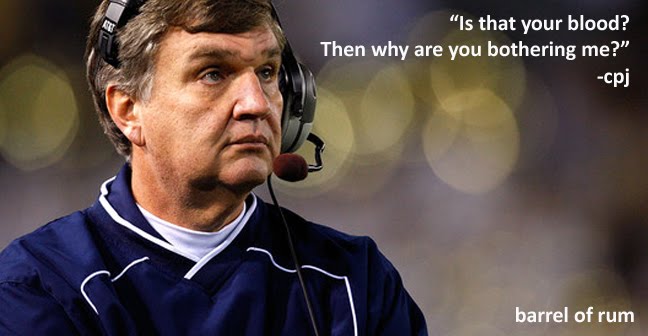Yesterday we posted two articles on Defense. Hash posted one on how a 4-3 defense can stop the option attack. It basically espoused the typical approach of "gap control". The tackle takes the dive, the end takes the quarterback and a linebacker or safety takes the pitch man. Everyone else works to contain the play and prevent cut backs or counter plays.
I actually think this is a recipe for disaster. It's passive and its predictable. Essentially, all you are doing is crossing your fingers and hoping one of your players makes a play or Tech makes an error, but you are playing Tech's game, and you are never going to win playing the other guy's game. You're asking your defensive tackle to beat a double team. You're asking your defensive end to shuffle sideways as fast as Josh Nesbitt runs, and you are asking your safety to make an open field tackle on Anthony Allen- every time. As for Tech making a mistake, how likely is that when your are essentially playing like a scout team defense?
Any coach that lines up and tries to simply control the gaps is going to get crushed by Paul Johnson. He'll figure out what you are doing, tweak his blocking scheme, call a counter or switch to the Mid-line or Belly Option and gouge you.
This brings me to the article I posted on the 3-3-5. Particularly the section that discusses why coaches that run Spread Option attacks like to hire 3-3-5 guys as defensive coordinators. At the core of the 3-3-5 is disguise and deception. Where players line-up is not indicative of their assignments after the snap. This makes the quarterback's pre-snap read difficult. It makes it hard for the offense to set up its blocking schemes, and it's easier to make plays against a confused offense.
In the example I gave yesterday, the quarterback may read the defensive end as the pitch key before the snap, but the end's responsibility may actually be the dive and a linebacker may step into the end spot to take the QB. A 3-3-5 defense isn't the only defense that can do this kind of thing - any defense with some basic zone blitz concepts can run this kind of play. The "33" just makes it an integral part of the defense.
I know what you are thinking: "But the defense doesn't know which side the offense is running the ball to, or even which option it is running". That's true in theory, but in reality, people, even Paul Johnson, have tendencies. That is where the Zen of Defense comes in. A defense's goal isn't to stop the offense from making plays. Its goal is that the offense doesn't make plays.
Confused?
Think about it. Tactically speaking there is no difference between a defensive end sacking a quarterback or the quarterback tripping over his own feet and falling down. A loss of down and distance is a loss of down and distance. Sometimes its dumb luck, like in this example, but there are things a defensive play caller can do to create luck. By changing up looks and play calls he can keep the offense off balance. If the offense can't get a good read on the defense it will be harder for it to find the weak link, even when that weak link is glaring. If the offense doesn't make a play, even when the defense is out of position, the defense wins.
Granted, no defensive coordinator wants blown assignments, but they are going to happen and a good mix of play calls can help mitigate that. Lets go back to my example from yesterday. Sure the defense doesn't know to which side the offense is going to run, but at the same time the offense doesn't know who's actually rushing the line. If its unclear whose rushing the line, then it's unclear which players the QB reads for his pitch keys. Now he's stuttering and thinking, and now your players have the advantage. That's coaching, not sitting in your gap and waiting for lightning to strike.
The trick for any defensive play caller is to strike a balance between doing the fundamentally sound thing and throwing in enough variety to keep the offense off balance. Against an option offense that means playing straight up gap assignment on most plays, but it also means picking the right spots to throw some variety at the offense to drive a shadow of doubt into the their mind. When that happens quarterbacks start falling down, wide open wide receivers don't get the ball, and offensive linemen miss blocks. It's the Zen of Defense.
Friday, November 20, 2009
Subscribe to:
Post Comments (Atom)


No comments:
Post a Comment